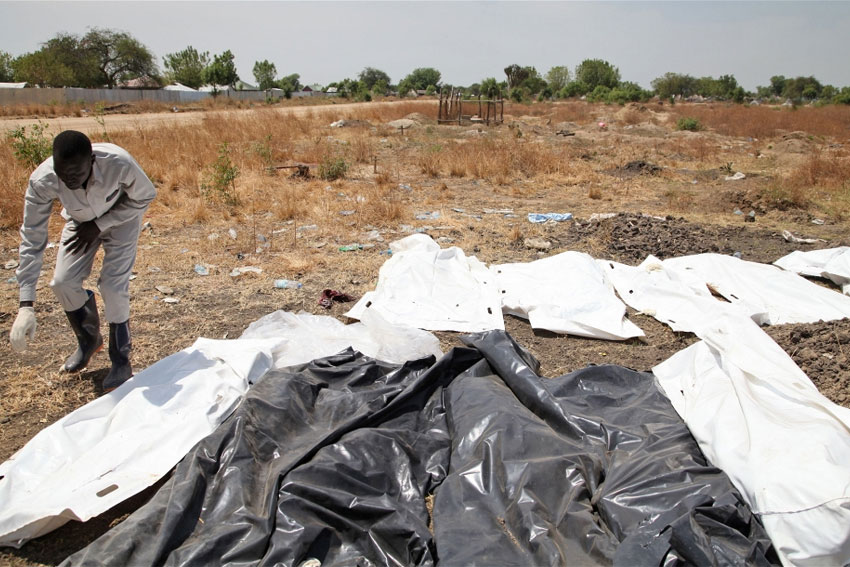February 04, 2026 07:44 am (IST)

South Sudan: UN reports gross rights abuses in conflict
New York, May 9 (IBNS): Gross human rights abuses have been committed by both sides in the brutal conflict that erupted in South Sudan at the end of last year, including rapes, mass killings and torture, and, according to a new United Nations report released on Thursday, civilians were not only caught up in the violence, they were directly targeted, often along ethnic lines.
“Based on thorough documentation and investigations, there are reasonable grounds to believe that gross violations of international human rights and humanitarian law have been committed by both parties to the conflict,” warned a report prepared by the UN Mission in South Sudan (UNMISS), which cites the conflict’s “devastating” impact on civilians, who have suffered mightily through attacks on hospitals and churches, and acts of sexual violence perpetrated against women of different ethnic groups.
The report provides a comprehensive account of human rights violations and atrocities perpetrated during the hostilities that engulfed South Sudan since 15 December 2013 and follows up on the interim report released by the Mission on 21 February.
Primarily based on more than 900 interviews with eye witnesses and victims, the report provides a succinct timeline of the conflict, which was sparked by a political dispute between President Salva Kiir, who belongs to the Dinka ethnic group, and former vice-president Riek Machar, who belongs to the Lou Nuer, and finds that “from the very outset…gross violations of international law…occurred on a massive scale.”
These findings were echoed by UNMISS chief Hilde Johnson in an interview earlier on Thursday with UN Radio, in which she said “grave violations and atrocities” have been committed by both sides as the fighting has spread through the country’s four states. She cited two “particularly horrific” incidents covered in the report – a mass killing early on in the conflict in a police station near Juba, and the killing of some 200 people in Bentiu two weeks ago.
In both instances, the killings were “clearly ethnically motivated,” she said, underscoring that “the need for accountability is absolutely essential…the perpetrators of such acts need to be held to account.”
Johnson said the report also tells the story of the conflict’s impact on the civilian population. “It shows attacks against women, children, the elderly and disabled,” she said, decrying not only “the ferocity of the abuses but the fact that incidents have been perpetrated where these vulnerable are being targeted equally – if not more than – fighting forces.”
“This is what is so sad and so enraging,” she said, reiterating the report’s call for an immediate end to the violence, and urging both parties to shoulder their responsibility to make this happen.
The report goes on to note that South Sudan has never undertaken a comprehensive, independent, and effective accountability process since it attained independence. As such, long-standing impunity and failure to treat killings, sexual and gender-based violence, and other gross human rights and humanitarian law violations as crimes, reinforces the cycle of conflict.
“Accountability is critical to end the legacy of impunity in South Sudan and prevent similar atrocities in the future. There can be no reconciliation without accountability. We call for a credible peace process that will lead to national healing and reconciliation,” said Johnson.
The conclusions call for further investigations and UNMISS welcomes both national and regional initiatives along these lines. Such investigations must move quickly and lead to the arrest and prosecution of perpetrators. They must also be conducted independently and in a transparent manner consistent with international standards and principles, the report concludes.
(A volunteer in the South Sudanese town of Bor arranges corpses, victims of repeated clashes between government forces and rebels. Photo: Hannah McNeish/IRIN)
Support Our Journalism
We cannot do without you.. your contribution supports unbiased journalism
IBNS is not driven by any ism- not wokeism, not racism, not skewed secularism, not hyper right-wing or left liberal ideals, nor by any hardline religious beliefs or hyper nationalism. We want to serve you good old objective news, as they are. We do not judge or preach. We let people decide for themselves. We only try to present factual and well-sourced news.
Support objective journalism for a small contribution.
Latest Headlines
Epstein Files: Images show Prince Andrew crouching over woman, spark fresh embarrassment
Sun, Feb 01 2026
Burkina Faso’s military junta bans political parties: What triggered the move and what lies ahead
Sat, Jan 31 2026
Trump threatens 50% tariff on 'all Canadian aircraft', stoking fresh tensions with Ottawa
Fri, Jan 30 2026
EU labels Iran's Revolutionary Guards as 'terrorist organisation' amid deadly crackdown on protests
Fri, Jan 30 2026
EU set to designate Iran’s Revolutionary Guards as terror organisation alongside Al Qaeda, Hamas
Thu, Jan 29 2026
Civilian train hit as Russian strikes leave 12 dead in Ukraine
Wed, Jan 28 2026







